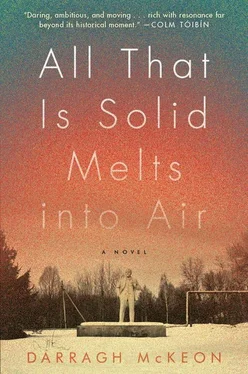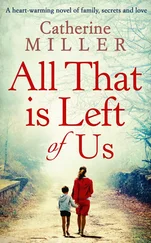“Your cards.”
“I’m sorry?”
“The cards.”
Artyom’s mother stalled, not understanding; surely they wouldn’t refuse them entry.
Artyom leaned in towards his mother. “She’s asking for the cards they gave us before we boarded the buses. When they scanned us with their metres.”
“Of course.” She directed her reply to the woman, and patted her body and pulled out a small purse from under her sweater with some roubles and three categorization cards.
The woman looked at them and asked Artyom’s mother to confirm their full names and dates of birth, which she did. The woman nodded towards Artyom and Sofya.
“You can’t hold their cards for them. They’ll need to show them any time they’re asked.”
“Of course.”
“Come with me.”
She led them to a door with a series of locks and took out a set of keys and turned the bolts one by one and told them to wait there. Artyom peeked inside, saw piles of green blankets set on top of desks, and he guessed that this room was originally the office area of whatever it was this warehouse stored. The woman returned holding a small stack.
She handed the blankets to Sofya, gave Artyom’s mother an improvised map, hand-drawn, showed them how the area had been divided into sections, and told them that they would collect their food once a day from the provisions area in the far corner of the building. Their section would be called over the loudspeakers and they would present their cards and get their food and bring it back to their living quarters. She said “living quarters” without a trace of irony, as if they should be grateful to inhabit a strip of carpet.
She pointed out their section and turned the map to the back, which revealed the number of their area. Artyom’s mother asked where the toilets were and the woman pointed to a sign with an arrow halfway down the left-hand wall.
Artyom’s mother asked if there were showers.
“There are no showers.”
“What about washing?”
“Let’s hope it rains every few days.”
Artyom’s mother took in this information without surprise.
“My husband is missing. Where can I find out about his arrival?”
The woman snorted through her nostrils. “Look around. Everyone’s husband is missing.”
They looked and could see very few men.
“A representative from the secretariat will visit this afternoon. We will know more then. Food will be handed out midmorning. Have your cards with you at all times. If you cannot present your card, we will confiscate your food. That is all.”
“One last thing.”
The woman paused, resenting the time that was being demanded of her.
“Do you know how long we’ll be here?”
“As long as you’re told.”
The woman turned away and sat on a chair against the wall and picked up a magazine.
They walked through the maze of carpet and cardboard and sprawled limbs, finally finding their area, a space just big enough for the three of them to lie side by side. At the farm, whenever a cow was sick, they would section it off in its own pen until it recovered. That pen was bigger than their area. Probably more comfortable too, Artyom thought, if the straw was fresh.
Sofya sat on the roll of undercarpet, and said, “So this is home.”
Artyom’s mother chewed her gums and nodded, not looking at them.
Artyom walked outside. He could hear his mother calling instructions to him in frustrated whispers, but he didn’t care. He needed to be alone. At least he could take in the peace of the morning. Everything that his eyes set upon was made of steel and concrete. A line of pylons stretched out with corkscrew endings, which balanced a series of buzzing wires. Trucks passed on the roadside; so fast and heavy that he could feel the concrete bounce under his feet.
Not a blade of grass to be seen.
Nothing breathing, not even himself.
All that had come before erased in a single day.
“HE’S ASLEEP NOW. We can get to work.”
Grigory’s voice brings Artyom back to the room. It takes a moment for him to readjust, to concentrate on the job at hand. He looks down and sees the dog at rest, a comical leer on its lips, its molars showing. He puts his hand in its coat. It’s good to touch the hair of an animal, coarse and alive.
Grigory says something, and Artyom turns around, not comprehending. Grigory repeats the word: “Ready?”
Gently, they turn the dog onto its back and Grigory clips its hindquarters, then shaves it with a razor, so that eventually the dog looks like a creature of two halves: hair and skin. Artyom can’t help but smile at how strange it looks, can’t help but think that if a dog has such a thing as vanity, it’s in for quite a surprise. Grigory instructs Artyom to hold its hindquarters off the floor, and he does so and is surprised at the weight of the animal. Grigory wraps plaster of Paris around its pelvis, dipping the swatches in the bowl of water before he does so, then has Artyom help him fold the dog’s legs into its body, so it can drag itself along while it recovers. They both take pleasure in their actions: healing something that contains no mystery; a broken bone that will be fixed, that is definable, a medical problem that has a resolution. And they both quietly look forward to the day when they will cut the bandage away from this animal and see it walk, unsteadily, across the yard, its trauma behind it.
Artyom is surprised at how quickly the bandages dry and, when the cast is set, they lay a blanket over the dog’s hunched form and Artyom looks at Grigory, a shine in his eyes.
“It’s yours now. You can take care of it,” Grigory says.
“We can’t move it. It’s asleep.”
“Of course not, but when it wakes.”
Artyom shakes his head sadly. “I can’t, my mother wouldn’t allow it into our quarters. Besides, what could I feed it? We barely have enough food already.”
“Well, let’s keep it here then. It’s your dog, but it lives here. I’ll have a word with the supply secretary, see if we can get some scraps.”
Artyom smiles wide and bright, and Grigory takes this as a gift for carrying the animal here, tending to it, a reward that makes it all more than worthwhile. They shake hands, an exchange that has a strange solemnity to it. The boy has an aura of experience, of gravitas, any youthful naivety long since departed.
“Batyr. I’m naming him Batyr.”
Artyom nods, taking in the fact with eagerness, the anticipation of a new parent stirring within him.
He repeats the name before he exits. “Batyr.” It’s the first good thing he’s done in months.
Maria is three hours into her shift when it happens. The commotion comes from above them, the metal stairway to the management offices. Shouting. A scuffle. At first they think it might be an argument between two senior managers, which would be a juicy piece of gossip in itself, but it’s a woman’s voice. There are no women on the management committee. Maria’s comrades stop and look up. They all instinctively press the suspension buttons on their machines before turning around. The whole place, powering down momentarily, the sound of forces slowing, cooling. Maria looks around and can see others looking around, captivated as the great beast to which they have chained themselves quietens its roar.
The void is replaced by a murmur. More shouts from the stairway. Those who can’t see spread word to those who can. It’s Zinaida Volkova. They can’t believe this. They ask those nearest to confirm and see a bundle of black cloth being ushered by three officials through the doors that lead to the reception area.
In the forty years Zinaida Volkova has worked in the plant, she has never been known to raise her voice.
Читать дальше












